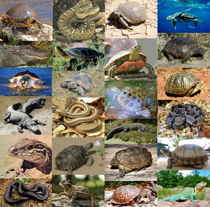Arizona State Reptile
Arizona Ridge-nosed Rattlesnake

(Crotalus willardi)
Adopted in 1988.
The Arizona Ridge-nosed Rattlesnake was adopted as Arizona's state reptile in 1988. Arizona ridge-nosed rattlesnake was the last rattlesnake to be named by herpetologists. This snake is small, rarely weighing more than 3-4 ounces as an adult or growing longer than 24 inches. The ridge-nosed rattlesnake inhabits only the Huachuca, Patagonia, and Santa Rita Mountains in south central Arizona - A.R.S. ? 41-859.
Arizona's state reptile is a relatively rare snake in the United States and perhaps the most beautiful of all eleven species of rattlesnakes found in Arizona. The scales on its upturned nose are what gives this reptile its name. It is rarely over 24 inches long or weighs more than three or four ounces.
Of the known 33 species of rattlesnake, 11 may be found in Arizona, more than in any other state in the US Rattlesnakes are divided into two genera: Crotalus and Sistrurus. Of Arizona's crotalid rattlesnakes, the ridge-nose is unique. Its Latin name comes from crotalum, the Greek word for "rattle," and willardi for Frank C. Willard, the Tombstone man who first found a specimen in the wild. This was the last rattlesnake to be named by herpetologists in the US
Arizona State Reptile:
Arizona Ridge-nosed Rattlesnake

Common
names: ridge-nosed rattlesnake, Willard's rattlesnake, Willard's rattler
Crotalus willardi is a venomous pit viper species found in the southwestern United States and Mexico. It is the most recent rattlesnake species
to be discovered in the United States. Its specific name is in honor of its discoverer, Professor Frank C. Willard.
The Arizona ridge-nosed rattlesnake is small and secretive. It rarely weighs more than 3-4 ounces as an adult or exceeds 24 inches in length. The
snakes are born in August or September and are usually 6-8 inches long, weighing as little as 1/4 of an ounce. Its upturned nose scales give this species
its common name. It has bold, white stripes on its brown face causing some people to speculate that the Chiricahua Apaches modeled their war paint
after this snake's facial markings.
In Arizona, the ridge-nosed rattlesnake inhabits only the Huachuca, Patagonia, and Santa Rita Mountains in the south central part of the state. Throughout
its range, ridge-nosed rattlesnakes may be found in cool canyons and pines at elevations of 5,000 - 8,000 feet. They like crevices of rocks and ground
cover in the cool, moist canyon bottoms. They are secretive and are active all day long, including early mornings or late afternoons. Sometimes, on
a very humid afternoon, they can be found quietly seeking the lizards, centipedes, small snakes, or small mice that are their main food.
The Arizona ridge-nosed rattlesnake is threatened by many of man's activities and, because of its limited range, is one of four rattlesnake species
on the list of Threatened Native Wildlife in Arizona. State law makes it illegal to kill or possess the
Arizona ridge-nosed rattlesnake without receiving special permits from the Arizona Game and Fish Department. Unfortunately, since this is a relatively
rare snake in the US, an illegal trade has developed for collectors that may further threaten the Arizona population.
Arizona Laws
As a result of the statewide contest, a mammal, a reptile, a fish and an amphibian were adopted at the same time and codified under one section, titled "State animals".
The law designating the Arizona ridgenose rattlesnake as the official Arizona state reptile is Section 41-859 (State animals) of the Arizona Revised Statutes, Title 41 (State Government) Article 5 (State Emblems) Section 41-859
TITLE 41. STATE GOVERNMENT.
ARTICLE 5. STATE EMBLEMS.
41-859. State animals. The ringtail or bassariscus astutus, the Arizona ridgenose rattlesnake or crotalus willardi, the Arizona trout
or salmo apache and the Arizona tree frog or hyla eximia shall be known respectively as the state mammal, reptile, fish and amphibian.
Taxonomic Hierarchy: Arizona Ridge-nosed Rattlesnake
Kingdom: Animalia
Phylum: Chordata
Subphylum: Vertebrata
Class: Reptilia
Order: Squamata
Suborder: Serpentes
Family: Viperidae
Subfamily: Crotalinae
Genus: Crotalus
Species: C. willardi








